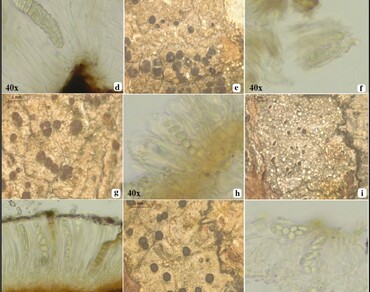New distributional records of lichenized fungi for India from Assam
Islary Pungbili, Nayaka Sanjeeva, Joseph Siljo, Upreti Dalip Kumar, Basumatary Derhasat, Daimari Rebecca
Research Articles | Published: 02 December, 2022
First Page: 1256
Last Page: 1264
Views: 3823
Keywords: Lichenized fungi, n Malmidean , Taxonomy, Ultapani
Abstract
Present paper deals with 21 species of lichenized fungi belonging to 11 genera and 8 families, collected from Ultapani Forest Range of Kokrajhar district, Assam, India situated in the foothills of Bhutan. The family Malmideaceae is dominant with 11 species followed by Graphidaceae with four species. Amongst genera, Malmidea exhibited as the most dominant genus with nine species followed by Graphis with four species. Eight species viz. Allographa myolensis, Graphis subintermedians, Malmidea coralliformis, M. perplexa, M. subgranifera, M. tratiana, Parmeliella cinerata and Pyrenula microtheca are new records to Indian lichen biota. A total of 13 species viz. Buellia tincta, Graphis nanodes, Hemithecium pulchellum, Heterodermia dissecta, Malmidea bakeri, M. fuscella, M. hypomelaena, M. psychotrioides, M. subaurigera, Parmotrema pseudotinctorum, Porina atroperiostiola, P. platystoma and Pyxine cylindrica are new additions to lichen biota of Assam. Brief description of each species along with their distributions are provided.

References
Aptroot A (2012) A world key to the species of Anthracothecium and Pyrenula. Lichenologist 44(1):5–53. https://doi.org/10.1017/S0024282911000624
Awasthi DD (1991) A key to the Microlichens of India, Nepal, Sri Lanka. BiblLichenolpp 40:1–340
Awasthi DD (2007) A compendium of the Macrolichens from India, Nepal, Sri Lanka, 1st ed. Bishen Singh Mahendra Pal Singh, Dehra Dun, India
Breuss O, Lücking R (2015) Three new lichen species from Nicaragua, with keys to the known species of Eugeniella and Malmidea. Lichenologist 47(1):9–20. https://doi.org/10.1017/S0024282914000565
Daimari R, Islary P, Brahma S, Basumatary S, Goswami JP, Nayaka S, Joseph S (2021) Additions to the lichen flora of Assam with special reference to Astrothelium alboverrucoides, a new record to India. Stud Fungi 6(1):342–351. https://doi.org/10.5943/sif/6/1/25
Daimari R (2016) Epiphytic lichens, their diversity, distribution and air pollution sensitivity in Sonitpur district, Assam. PhD thesis, Department of Environmental Science, Tezpur University, Assam, India
Gogoi R, Devi D, Nayaka S, Yasmin F (2022) A checklist of lichens of Assam, India. Asian J Conser Biol 11(1):49–65. https://doi.org/10.53562/ajcb.73760
Gupta P, Sinha GP (2018) Lichen flora of Assam. J For Add Ser V Bishen Singh Mahendra Pal Singh
Islary P, Daimari R, Nayaka S, Joseph S, Upreti DK, Biswas S (2021) Occurrence of 26 new additional records to the lichen biota of Assam. Asian J Conser Biol 10(2):211–221. https://doi.org/10.53562/ajcb.68956
Lücking R, Archer AW, Aptroot A (2009) A world-wide key to the genus Graphis (Ostropales: Graphidaceae). Lichenologist 41(4):363–452. https://doi.org/10.1017/S0024282909008305
Orange A, James PW, White FJ (2010) Microchemical methods for the identification of lichens, 2nd edn. British Lichen Society, London
Sharma BO, Khadilkar P, Makhija U (2012) New species and new combinations in the lichen genera Fissurina and Hemithecium from India. Lichenologist 44(3):339–362. https://doi.org/10.1017/S0024282911000752
Soundararajan S, Shanmugan P, Nagarajan N, Palanisamy D, Ponnusamy P (2019) In vitro study on screening antimicrobial and anti-oxidant potential of Ramalina fastigiata. J Drug Deliv Ther 9(1):216–219. https://doi.org/10.22270/jddt.v9i1.2217
Stirton J (1881) On the vegetable parasite of the tea plant, more especially of Assam. Proc R Philos Soc Glasgow 13:181–193
Wijayawardene NN, Hyde KD, Al-Ani LKT et al (2020) Outline of Fungi and fungus-like taxa. Mycosphere 11(1):1060–1456. https://doi.org/10.5943/mycosphere/11/1/8
Author Information
Department of Botany, Bodoland University, Kokrajhar, India